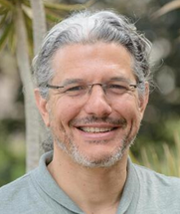Yuval Oreg

Prof. Yuval Oreg was born in Israel and received his BSc (1988) and MSc (1991) degrees in physics from Tel Aviv University. He received his PhD in Physics from the Weizmann Institute in 1997, and was recruited to the Department of Condensed Matter Physics in 2000, after completing postdoctoral studies at the Lyman Laboratory in Harvard University. He holds the Lady Davis Professorial Chair of Physics, he is the director of the Goldschleger Center for Nanophysics, and an avid supporter of the physics Olympiad team of Israel.
Prof. Oreg is a theoretical physicist whose research interests focus on the interactions between electrons in nanoscale systems. His theoretical studies are in the field of strongly correlated electron quantum systems in condensed matter. In such sy stems, the particles (electrons) cannot be considered independently; rather, their behavior at low temperatures is governed by collective many body physics. The superimposed wavy nature of the electrons makes the problems in this field exceptionally rich and complex and may lead to exotic phenomena. He has been involved in developing ways to construct special states of matter such as the topological superconductivity that supports Majorana fermion. It may serve as a key element in future quantum computers and may help contribute to the development of improved small electronic devices.
In 2013, Prof. Oreg received the Michael Bruno Memorial Award given by the Israel Institute for Advanced Studies at the Hebrew University of Jerusalem. He also was the recipient of the Segre Rosa and Emilio Research Award in 2010-2011, the 2006 Morris L. Levinson Prize in Physics, and the 2003 Friedrich Wilhem Bessel Research Award from the Alexander von Humboldt Foundation. In 1997, he received the John F. Kennedy Prize of the Feinberg Graduate School at the Weizmann Institute, as well as the Fulbright and Rothschild fellowships.
His research findings have been published extensively in more than 170 publications that are cited more than 11000 times.